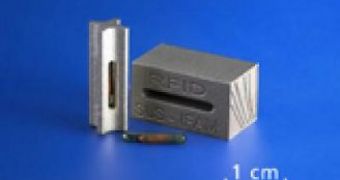In a move that is bound to restrict people's privacy, as always, researchers have discovered a new way of implanting RFID (Radio Frequency Identification) chips into much more material and products than thought possible. Until now, only things that were made at temperatures of less than 100 degrees Celsius could receive the “implants,” but that seems to have changed. German scientists at the Fraunhofer Gesellschaft have found a way of putting the “tags” into more advanced objects, that require advanced and hot production processes.
The team, which is based at the Fraunhofer Institute for Manufacturing and Advanced Materials IFAM, in Bremen, was so successful in its quest, that it created a method of completely encasing the RFID chip into a solid block of metal, so that it cannot be removed. The thing about these chips is that they label objects or goods with a unique radio frequency, which can then be detected with specialized equipment. A lot of data is contained in these “labels” and anyone armed with the correct scanner can read them.
“This new process finally puts the intelligence into the metal component. You can store critical information in the radio tags, like the serial number or the manufacture date. So, for example, companies now can make their top-grade replacement parts tamper-proof and resistant to fraud,” says Claus Aumund-Kopp, who is the IFAM project manager. The expert also admitted that trying to remove the chip would result in it being damaged beyond repair. In the future, the team says, plans are to make the chip into a storage device that could retrieve information about how the product in which it is placed is used.
The research team says that sensors and actuators placed inside metal components for example, could provide necessary data on thermal or mechanical stresses that the piece of metal is subjected to, which may help companies design better parts. While this is true, people should be given the option to take away the chips, so as not to have their habits observed day after day. It is, after all, a matter of privacy, which we seem to be getting increasingly less of lately.

 14 DAY TRIAL //
14 DAY TRIAL //